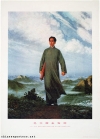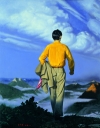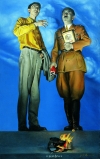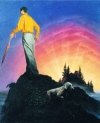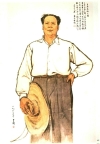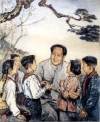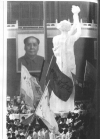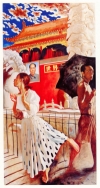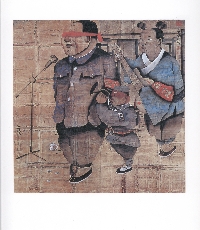
Illustration:
ill. 5.26
Author:
Zhu Wei (1966-) 朱伟
Date:
1996
Genre:
painting
Material:
scan, paper, colour; original source: ink and colour on paper, 132 x 132 cm, with five seals of the artist
Source:
Zhu 1996: Zhu Wei. China Diary. Hong Kong: Plum Blossoms Galler, 1996, no 16.
Courtesy:
Zhu Wei
Inscription:
中国日记, 催健
Keywords:
China Avant-Garde, tradition, modernity, blindfold, Cultural Revolution, Mao Cult, rock’n’roll, Cui Jian, music
Zhu Wei: China Diary, No. 16 - Mao as Cui Jian (Zhu Wei: Zhongguo riji shiliu hao - Mao Cui Jian 朱伟: 中国日记十六号 毛催健)
Zhu Wei’s 朱伟 (1966-) reconfiguration of Mao as rock musician Cui Jian, complete with blindfold in red cloth, as no. 16 of his China Diary 中国日记十六号 (1995-2002) alludes to that famous (censored) song A Piece of Red Cloth 一块红布 by Cui Jian which may be read as a lovesong and as a political song about a youthful love for Mao, the scorching sun, who turns out to be much less a saviour bringing happiness than a dangerous master. Wang Shuo, had once called the Cultural Revolution “a rock’n’roll concert with Mao as top rocker and the rest of the Chinese as his fans.” (Huot 2000:59): Zhu Wei now illustrates precisely this idea.
Mao with his characteristic mole, blue suit, and red armband—which does not read “Red Guard,” but “Pink Floyd,” a group Cui Jian considered one of the best bands in the history of rock 对是摇滚史上最伟大的乐队之一—stands at the microphone, with his hands in his pockets, himself slipping into the role of both enthusiast and accuser, singing: That day you used a piece of red cloth/To blindfold my eyes and cover up the sky/You asked me what I had seen/I said I saw happiness (幸福)....
The painting’s effect builds on incongruities: between Mao and the rock singer accusing him of delusion, between contemporary theme and traditional painting fashion (Zhu Wei uses the gongbi 工笔 technique, a modern term for fine outline and colour painting, distinguished from xieyi 写意 or cubi 粗笔 technique, which denotes loosely brushed ink painting), and between new paraphernalia like microphone and electronic guitar and old, traditional dress and hairstyle of the guitar player in the back. Zhu Wei is known for creating “symbols of reality.”
His musical painting not unlike the very “pictorial music” that Cui Jian wrote and performed, is an only slightly irreverent reflection on Mao and his possible entanglements with and estrangements from the politics associated with his name. The piece is a thoughtful and thought-provoking “product of a distinct time and consciousness” (Jia 1996:5), that of the turn to the 21st century when reflections of Mao also became ways of deliberating current issues and concerns. Mao and his obvious self-doubts are a projection of the self-doubts of a younger generation concerning their own or their parent’s life under Maoism and how to live with this Maoist heritage.
